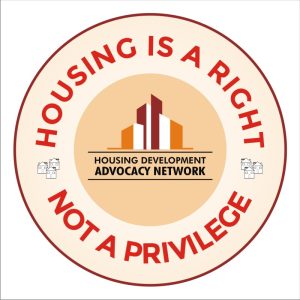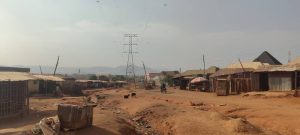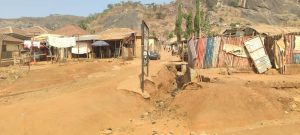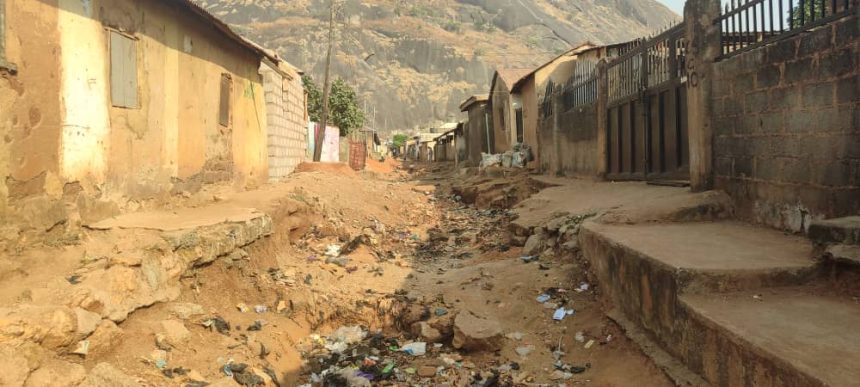Sokale is an Abuja suburb located near the popular Dutse Alhaji in the Bwari Area Council of the Federal Capital Territory. This thriving suburb is about 22 km from the city centre and is home to over 2,000 residents who have made this rock-tucked community their home.
In this special report, Housing TV Africa visited Sokale, one of Abuja’s most craggy, rocky, and rustic communities. Modern infrastructure and basic amenities have eluded thousands of its inhabitants, who are mostly low-income workers, petty traders, and artisans.
The bumpy ride from the Sokale main road entrance at the popular Sokale roundabout on the double-lane expressway leading to Bwari and the Nigerian Law School is dilapidated and unmotorable, and almost impassable during the rainy season. This rutted and impassable Sokale main road connects the community to News Engineering, Dawaki.

One would think that only the main road is impassable and in a state of disrepair, but the adjoining roads and streets within Sokale are not motorable, and when it rains, it is hectic for pedestrians to even navigate through them. Sokale’s topography as a foothill settlement contributes to the degraded and erosion-laden streets there, as there is no infrastructure to effectively channel the huge flow of water from the rocks to the community.
In an interview with Housing TV Africa, a resident of the town, Mr Salihu Musa, who relocated to Sokale 18 years ago, decried the absence of infrastructure within the community and called on the authorities to look into it. Salihu alluded to the fact that not much has changed in Sokale in 18 years, jokingly saying only the house rent has changed, and nothing else.

To cap it all off, the ecological disaster plaguing the community is even exacerbated by the indiscriminate dumping of refuse on long stretches of gully like streets in the area. The total absence of an effective waste management system within the community and most suburbs in Nigeria’s Federal Capital Territory is worrisome as a train wreck waiting to happen.
Despite its huge population and boisterous commercial activities, Sokale is without a standard government primary and secondary school. Tens of hundreds of children who are of school age are either enrolled in mediocre private schools or have to journey over 4 km to Dutse Alhaji town to enrol in government schools.
Mr Michael Ojiri, another resident and civil servant who resides in the community, expressed worry over the state of insecurity within the community and called on the government, especially the chairman of Bwari Area Council, to assist the community in completing the community police post started through communal efforts. Mr. Ojiri confided in our reporter that his handsets and other valuables were stolen from his room through the window while he was asleep, and said these occurrences are frequent in the community.

Another resident, Mrs Emmanuel Ijewa, a businesswoman and point-of-sale terminal operator, said residents are tired and have written series of letters to the authorities to look into their plight and help fix the pothole-laden Sokale road to ease the commuting experience without any tangible response from the authorities.
Residents who reside uphill within the area pay as much as 400 naira for a 20-litre jerrycan of water. In the same vein, inhabitants of Sokale travel miles to get affordable health care, as there is no primary health centre or any other government hospital in the area.
Notwithstanding the deteriorating and decaying infrastructure in Sokale, shockingly, prices of rent here are not too affordable, and the informal real estate market is thriving on the backbone of thousands of Nigerians who are not keen to pay more for rent in the city. A room without a toilet and a kitchen in Sokale costs an average of N150,000; a self-contained apartment N300,000; and a one-bedroom apartment N500,000.

The situation in Sokale presents a stark contrast between the resilience of its residents and the glaring neglect by successive governments. Despite the thriving spirit of its inhabitants and bustling commercial activities, the community is plagued by a severe lack of basic infrastructure, including motorable roads, adequate schools, healthcare facilities, and provision of security.
The challenges faced by Sokale’s residents, from navigating impassable roads to accessing essential services like healthcare and access to education, paint a picture of a community struggling under the weight of systemic government neglect. The exorbitant rents in the face of such deprivation further exacerbate the hardship faced by low-income families who are facing the excruciating pains of high inflation, spike in fuel and food prices.
It is therefore incumbent on the government at all levels within the nation’s capital to take immediate and concerted efforts in addressing the dire needs of Sokale and if possible capture Sokale in its slum upgrade scheme and give residents a new lease of life.
Only through deliberate and sustained effort can Sokale be transformed from a community struggling to survive into one that thrives, offering its residents the basic necessities and opportunities they deserve. The time for action is now; further delay will only perpetuate the suffering of residents of Sokale and deepen the existing inequalities pervasing Nigeria.



